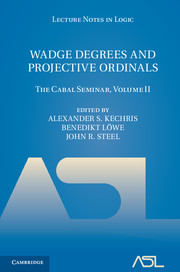Preface
Published online by Cambridge University Press: 05 December 2011
Summary
This book continues the series of volumes containing reprints of the papers in the original Cabal Seminar volumes of the Springer Lecture Notes in Mathematics series [Cabal i, Cabal ii, Cabal iii, Cabal iv], unpublished material, and new papers. The first volume, [Cabal I], contained papers on games, scales and Suslin cardinals. In this volume, we continue with Parts III and IV of the project: Wadge degrees and pointclasses and Projective ordinals. As in our first volume, each of the parts contains an introductory survey (written by Alessandro Andretta and Alain Louveau for Part III and by Steve Jackson for Part IV) putting the papers into a present-day context.
In addition to the reprinted papers, this volume contains papers by Steel (More measures from AD) and Martin (Projective sets and cardinal numbers) that date back to the period of the original Cabal publications but were not included in the old volumes. Jackson contributed a new paper Regular cardinals without the weak partition property with recent results that fit well with the topic of Part IV. The paper Early investigations of the degrees of Borel sets by Wadge is a historical overview of the process of the development of the basic theory of the Wadge degrees. Table 1 gives an overview of the papers in this volume with their original references.
As emphasized in our first volume, our project is not to be understood as a historical edition of old papers. In the retyping process, we uniformized and modernized notation and numbering of sections and theorems.
- Type
- Chapter
- Information
- Wadge Degrees and Projective Ordinals , pp. ix - xiiPublisher: Cambridge University PressPrint publication year: 2011

